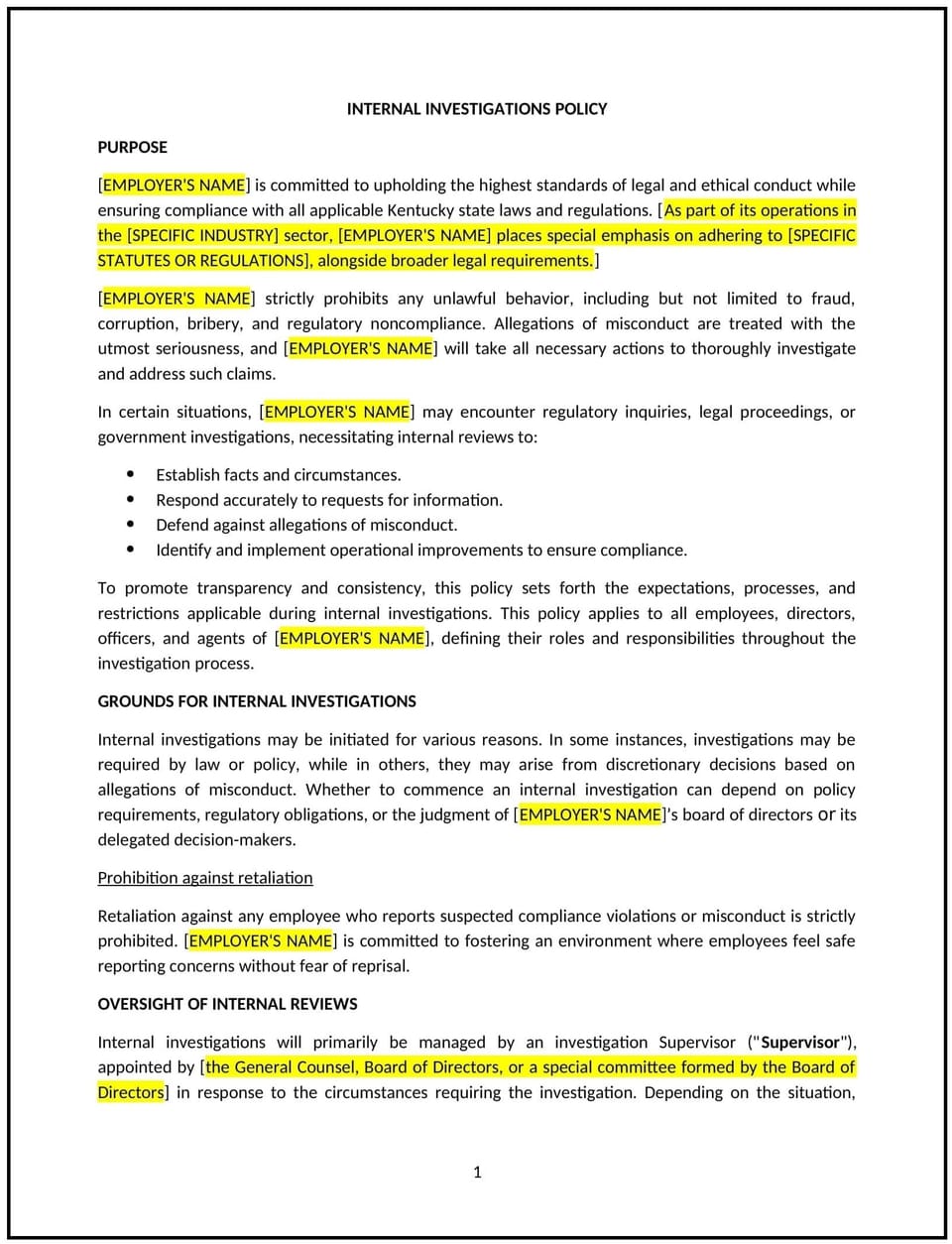Internal investigations policy (Kentucky): Free template

Internal investigations policy (Kentucky)
An internal investigations policy outlines the procedures that Kentucky businesses follow to address concerns, complaints, or allegations of misconduct within the organization. This policy ensures that investigations are conducted fairly, promptly, and supports compliance with relevant laws, maintaining confidentiality and protecting the rights of all involved parties.
By adopting this policy, businesses can resolve internal issues effectively, uphold ethical standards, and maintain a respectful and compliant work environment.
How to use this internal investigations policy (Kentucky)
- Define the scope of investigations: Clarify the types of incidents that will trigger an internal investigation, such as allegations of harassment, discrimination, fraud, theft, or policy violations.
- Assign roles and responsibilities: Specify who will conduct the investigation (e.g., HR, compliance officers, or external investigators) and the roles of managers, employees, and witnesses in the process.
- Set procedures for reporting concerns: Provide a clear process for employees to report concerns or allegations, including anonymous reporting options if necessary.
- Ensure confidentiality: Stress the importance of maintaining confidentiality throughout the investigation, protecting the identities of witnesses and those involved in the investigation.
- Conduct a fair and impartial investigation: Outline how the investigation will be conducted, including interviewing witnesses, reviewing relevant documents, and maintaining objectivity.
- Establish timelines: Set clear expectations for how long investigations will take, ensuring they are completed as promptly as possible while maintaining thoroughness.
- Address outcomes: Describe how the findings of the investigation will be communicated, the potential consequences of misconduct, and how corrective actions or disciplinary measures will be implemented.
Benefits of using this internal investigations policy (Kentucky)
This policy provides several key benefits for Kentucky businesses:
- Resolves issues promptly: Provides a structured process for addressing misconduct or disputes, ensuring that issues are resolved efficiently and fairly.
- Protects employee rights: Ensures that investigations are conducted fairly and that the rights of all employees involved are protected.
- Reduces legal risks: Helps the business comply with federal and state laws regarding employee misconduct and discrimination, reducing the risk of legal claims or lawsuits.
- Promotes ethical behavior: Demonstrates the business’s commitment to maintaining ethical standards and creating a respectful workplace.
- Enhances transparency: Builds trust within the organization by ensuring investigations are handled transparently and impartially.
Tips for using this internal investigations policy (Kentucky)
- Communicate the policy: Ensure that all employees are aware of the policy and understand the process for reporting concerns or allegations.
- Provide training: Offer training for managers and HR personnel on how to handle investigations impartially and in compliance with the policy.
- Keep investigations confidential: Emphasize confidentiality throughout the investigation process to protect the privacy of all involved parties and prevent retaliation.
- Monitor the process: Ensure that investigations are conducted in a timely manner and that all parties are kept informed of progress.
- Review periodically: Update the policy regularly to reflect changes in Kentucky laws, federal regulations, or the business’s internal processes.
Q: What is the purpose of an internal investigations policy?
A: The policy provides guidelines for handling allegations of misconduct or policy violations in the workplace, ensuring investigations are fair, thorough, and legally compliant.
Q: Who is responsible for conducting internal investigations?
A: The policy designates specific personnel, such as HR professionals, compliance officers, or external investigators, to handle investigations in a fair and impartial manner.
Q: How should employees report misconduct or concerns?
A: Employees should report concerns through the designated channels outlined in the policy, which may include direct reporting to HR, a hotline, or an anonymous reporting system.
Q: What happens if an investigation reveals misconduct?
A: If misconduct is found, the business will implement appropriate corrective actions or disciplinary measures, as outlined in the policy.
Q: How long does an internal investigation take?
A: The policy sets expectations for the timely completion of investigations, but the length of an investigation may vary depending on the complexity of the issue.
Q: How should the findings of an internal investigation be communicated?
A: The findings will be communicated to the appropriate parties, and any actions taken as a result will be addressed in accordance with the business’s disciplinary procedures.
Q: How often should the internal investigations policy be reviewed?
A: The policy should be reviewed regularly to ensure it remains in line with changes in Kentucky laws, best practices, and the business’s evolving needs.
This article contains general legal information and does not contain legal advice. Cobrief is not a law firm or a substitute for an attorney or law firm. The law is complex and changes often. For legal advice, please ask a lawyer.


